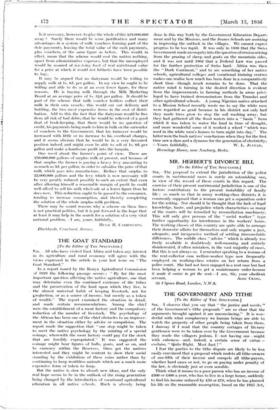THE GOAT STANDARD
[To the Editor of Tol: SPECTATOR.
Sm.— All who have visited East Africa and taken any interest in its agriculture and rural economy will agree with the views expressed in the article in your last issue on "The Coat Standard."
In a report issued by the Kenya Agricultural Commission of 1929 the following passage occurs : " By far the most important question affecting the native agriculture, one that may determine even the continued existence of the tribes and the preservation of the land upon which they live, is the almost universal habit of keeping livestock, not for production, or as a scamce of income, but merely as a token of wealth." The report examined the situation in detail, and made certain recommendations. Among the chief were the establishment of a meat factory and the compulsory reduction of the number of livestock. The psychology of the African has been one of the chief obstacles to an improve- ment in the situation either by advice or compulsion. The report made the suggestion that " one step might be taken to meet the native psychology by the minting of a special coinage, wherewith the meat factory could pay far the stock that arc forcibly- expropriated." It was suggested the coinage might bear figures of bulls, goats, and so on, and be currency within the Reserves. Once get the natives interested and they might be content to show their social standing by the exhibition of these coins rather than by continuing to keep worthless animals which are a much more expensive form of token to keep.
But the native is slow to absorb new ideas, and the only real hope seems to be in the outlook of the rising generation being changed by the introduction of vocational agricultural education in all native schools. Much is already being
done in this way both by the Government Education Depart- ment and by the Missions, and the Jeanes Schools are assisting in improving the outlook in the villages. We cannot expect progress to be too rapid. It was only in 1838 that the Swiss Government made an enquiry into the question of erosion arising from the grazing of sheep and goats on the mountain sides, and it was not until 1902 that a Federal Law was pawed for the further protection of Swiss land. Africa was then the Dark Continent," and to see something of her native schools, agricultural colleges and vocational training centres makes one realise how much has been done in a comparatively short time—though much remains to be done. That the native mind is turning in the desired direction is evident from the improvements in farming methods in areas privi- leged to have trained demonstrators from the Transkei and other agricultural schools. A young Nigerian native attached to a Mission School recently wrote me to say the white men were regarded as genii because in his district not only had they made trees grow to stop the soil washing away, but they had gathered all the flood waters into a " basin " from which it was taken to water the land in time of drought, and more wonderful some of it worked a wheel " which was used in the white men's houses to turn night into day." The latter were the bush natives' conclusions when they for the first time saw a dam and a dynamo for the generation of electricity.














































 Previous page
Previous page